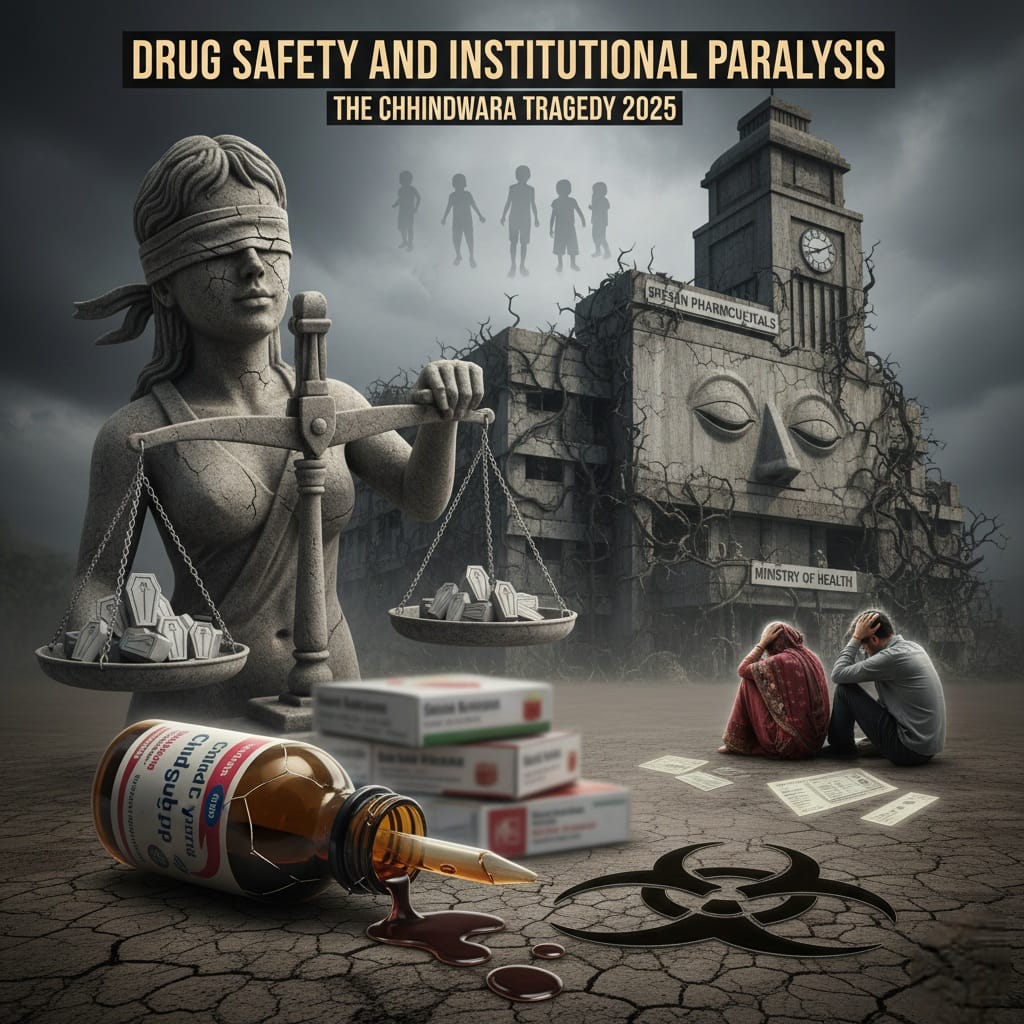Introduction
In 2025 there was a tragedy that no one could ever have imagined the Cough Syrup Tragedy claiming the lives of at least 21 children in the district of Chhindwara. This entire contention revolves around use of surprising quantities Diethylene Glycol (DEG), a lethal industrial solvent at 48.6%. This organised crime indicates the failure of government machinery and businesses crushing human ethics. This tragedy has lead to subsequent controversial events of arrest from the prescribing doctor to the manufacturer. Igniting debates on the question of liability of the said incident.
What happened that day ?
The misfortune surrounding the Coldrif in the state of Madhya Pradesh which intended on be a life saver but turned to be life killer to juveniles forcing the collapse of grief of their parents. The sleeping government was brought to wake by the alarm of death of 21 children around Chhindwara. Similar pre death health patterns were observed in the death of all 21 children. The frank use of an industrial solvent Diethylene Glycol (DEG) that substituted for a safe pharmaceutical ingredient in cough syrup manufacturing industry.
The syrup was poisoned with stunning amounts of lethal concentration of 48.6% weight/volume of DEG. After a chain of incidents and continuous occurring of deaths, the regulatory investigation agencies of Tamil Nadu and Madhya Pradesh unmasked the culprit Sresan Phramaceuticals based in Kanchipuram, Tamil Nadu. The manufacturer didn’t comply to the regulations of by intentionally using non pharmaceutical grade Propylene Glycol without even testing the raw material for contaminants. The Sresan Pharmaceuticals is guilty for violations for over 364 manufacturing deficiencies and infrastructure failures, this event is critically questioned by the government agencies and pharmaceutical industry upon their efficiency and trustworthiness.
The adulterated syrup induced rapid Acute Kidney Injury (AKI), and Anuria (inability to pass urine) in children, compelling their progenitors to exhaust their savings and burdening them with financial loans, leading to sale of land and jewellery. Even though the medical practitioners were alarmed regarding the subsequent deaths of children the institutional paralysis prevailed. When the Tamil Nadu authorities took cognizance and tested the syrup eventually leading to the ban on Sresan Pharmaceuticals followed by arrest of the owner within 36 hours of making the request. Even after grievous actions enforced by the Tamil Nadu government, the institutions Madhya Pradesh resisted from releasing a report on Coldrif or taking cognizance of the deaths caused for straight 9 long days.
The owner of Sresan Pharmaceuticals G. Ranganathan was charged with culpable homicide followed by this arrest. Parallelly Dr. Pravin Soni was arrested by the Madhya Pradesh police, these actions were severely condemned by Indian Medical Associations citing that “classical example of legal illiteracy” resembling that it is the failure of government machinery where a doctor prescribed a government approved drug under Bonafide intention. Therefore, it is the government regulatory bodies who permit the usage of such unsafe drugs. Two senior drug inspectors were suspended for negligence to conduct mandatory inspections at Sresan facility. This tragedy has triggered the past incidents of Gambia 2022 lightening the gravity of the situation.
Conclusion
This tragedy raises several unanswered questions on liability, duty of statutory regulations, efficiency of government and the implementation of Article 21 Right to Life. No doubt there is failure and negligence on the part of both industrial professionals and the government. This case is a realisation to the government that the lives of its citizens stand on a fragile and weak base, therefore an urgent need of a practically efficient and enforceable framework to regulate the pharmaceutical industry. On the land of Ayurveda, today the natives are falling prey to medicines itself.
Authored By
Atharva Gajanan Jakkalwar, a 2nd year student pursuing his B.A., LL.B. degree at the Maharashtra National Law University Mumbai, is a committed scholar of legal studies. With a focused interest in Constitutional Law, Jurisprudence, and Election Law, Atharva actively engages with complex legal principles and the practical applications of law, establishing himself as a keen observer and an aspiring legal analyst.

